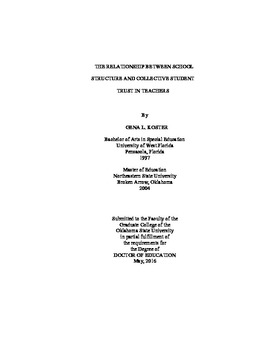| dc.contributor.advisor | Curry, Katherine | |
| dc.contributor.author | Koster, Gena L. | |
| dc.date.accessioned | 2017-02-22T22:09:55Z | |
| dc.date.available | 2017-02-22T22:09:55Z | |
| dc.date.issued | 2016-05 | |
| dc.identifier.uri | https://hdl.handle.net/11244/48832 | |
| dc.description.abstract | An awareness of the importance of trust as a cultural component of schools is growing among school administrators who seek to improve student outcomes; therefore, it is important to note that relatively little effort has been made to study student trust in teachers. Evidence suggests that trust is a necessary feature of effective, cooperative interactions within schools that lead to improved teaching and learning in the relationship between superintendents and boards, principals and teachers, parents and schools, students and parents, and students and teachers. An enabling bureaucracy is a structure that is helpful and leads to problem-solving among members rather than rigid coercive activities that demand conformity. | |
| dc.description.abstract | The purpose of this study was to test the relationship between enabling school structures and the formation of collective student trust. This study was built upon the extensive research by Adams and Forsyth on their generalized model of the formation of collective student trust. Quantitative survey data were collected from teachers and students in 72 elementary and secondary school sites within a large urban district. Students from the 5th, 7th, 9th, and 11th grades were randomly sampled. | |
| dc.description.abstract | Understanding enabling school structures through the lens of the self-determination theory indicates that schools with enabling structures have the potential to promote teacher perceptions of autonomy, competence, and relatedness which can lead to the promotion and encouragement of authentic and trusting relationships between teachers and their students. While results of the study indicate that these conditions do not directly or significantly relate to the formation of student trust, there is evidence that enabling structures lends to an environment of relationally supportive teaching and learning conditions. Findings from this study suggest that teacher-student relationships of trust can exist beyond or regardless of how restrictive, rule-binding or hindering the structures have been established. The study further finds that external factors such as minority status and economic status can impact the development of student-teacher trust. | |
| dc.format | application/pdf | |
| dc.language | en_US | |
| dc.rights | Copyright is held by the author who has granted the Oklahoma State University Library the non-exclusive right to share this material in its institutional repository. Contact Digital Library Services at lib-dls@okstate.edu or 405-744-9161 for the permission policy on the use, reproduction or distribution of this material. | |
| dc.title | Relationship between school structure and collective student trust in teachers | |
| dc.contributor.committeeMember | Harris, Ed | |
| dc.contributor.committeeMember | Krumm, Bernita | |
| dc.contributor.committeeMember | Self, Mary Jo | |
| osu.filename | Koster_okstate_0664D_14700.pdf | |
| osu.accesstype | Open Access | |
| dc.type.genre | Dissertation | |
| dc.type.material | Text | |
| thesis.degree.discipline | School Administration | |
| thesis.degree.grantor | Oklahoma State University | |
